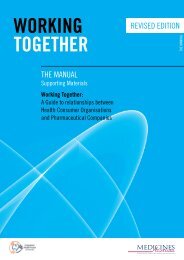Transition in Chronic Illness - Understanding Transition
Transition in Chronic Illness - Understanding Transition
Transition in Chronic Illness - Understanding Transition
- No tags were found...
You also want an ePaper? Increase the reach of your titles
YUMPU automatically turns print PDFs into web optimized ePapers that Google loves.
• Describe the context of what is happen<strong>in</strong>g:What are your thoughts?How long have you been mull<strong>in</strong>g over this?Th<strong>in</strong>k<strong>in</strong>gWhen th<strong>in</strong>k<strong>in</strong>g, we aim to clarify mean<strong>in</strong>g and <strong>in</strong>crease our understand<strong>in</strong>g of the why, when, what,where, how… of our experiences. Describe the issues and th<strong>in</strong>k about what we need to do with/about them. We can ask ourselves questions like:• What’s the ma<strong>in</strong> issue?• Why is this happen<strong>in</strong>g?• What was the trigger or cause?• What are the consequences?• How have you been behav<strong>in</strong>g? (eg is it usual for you to respond <strong>in</strong> anger <strong>in</strong> this situation?)• Which area/s can you act upon?• How might the action look?• When should you beg<strong>in</strong>- what order…?• How should you do it?• What are your strengths?Try writ<strong>in</strong>g down the answers to these questions. This may br<strong>in</strong>g clarity for you and give you someresponses that you can consider over time.Action<strong>in</strong>gTh<strong>in</strong>k<strong>in</strong>g about change does not effect change. We can spend a lot of time th<strong>in</strong>k<strong>in</strong>g about what wewould like to change but never take a step toward mak<strong>in</strong>g change happen. Action<strong>in</strong>g requires thatwe become <strong>in</strong>volved with our current situation and choose actions that take us toward our chosengoals. Often there is little choice about the need to change, and so our choice is about how we willchange. A good place to start is to th<strong>in</strong>k about what could/should be done differently to get thedesired outcome. Then we can beg<strong>in</strong> to action the smallest and most easily managed act that wouldhave the most benefit to our wellbe<strong>in</strong>g.• What area/s do you want to act on first?• What is most important to you right now?• What is most achievable th<strong>in</strong>g you can act on right now?• What’s the likely outcome of the action?• What will help you to achieve the goal?• Which people can help?• Where can you f<strong>in</strong>d support if needed?18<strong>Transition</strong> <strong>in</strong> <strong>Chronic</strong> <strong>Illness</strong> | Booklet 11 | Understand<strong>in</strong>g <strong>Transition</strong>















